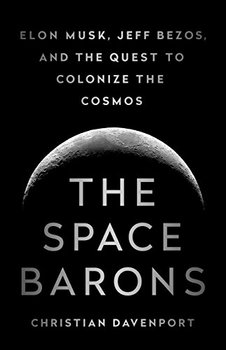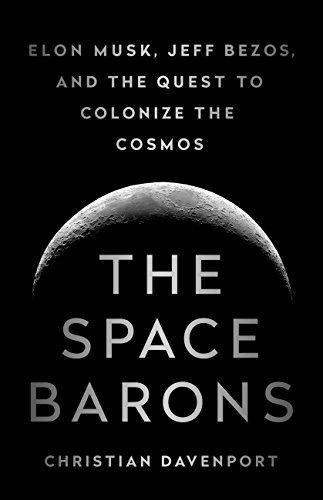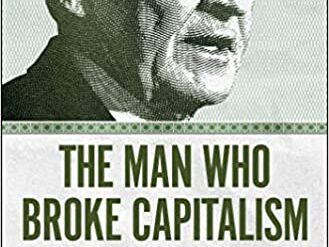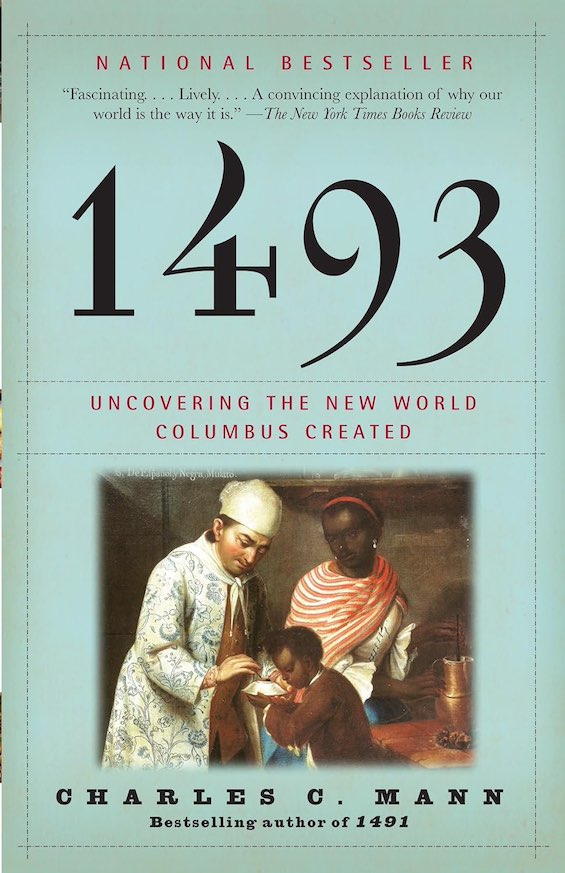
Not long ago, I reviewed Elon Musk: Tesla, SpaceX, and the Quest for a Fantastic Future by Ashlee Vance, and The Everything Store: Jeff Bezos and the Age of Amazon by Brad Stone. My reviews are at Elon Musk wants to build a colony on Mars (for real) and The Jeff Bezos story, or why I hate Amazon.com, respectively. Both books are well done. They’re the product of professional journalists who are good at what they do. But neither book comes close to Christian Davenport’s superb new book, The Space Barons: Elon Musk, Jeff Bezos, and the Quest to Colonize the Cosmos, in offering insight into the personality of these two extraordinary men who are the central characters in his book.
Estimated reading time: 5 minutes
Illuminating personal details
The personal details about the lives of Musk and Bezos are abundant and highly revealing. For example, here is Davenport with an anecdote from the early life of Elon Musk: “He had such concentration that as a toddler in Montessori school, his teachers would have to pick him up—in his chair—to keep him moving from task to task.” And this about Bezos: “His girlfriend from high school had once told an interviewer that Bezos had founded Amazon in order to make enough money to start a space company.” Davenport notes that Bezos “conceded that there ‘is some truth to that.'”
The Space Barons: Elon Musk, Jeff Bezos, and the Quest to Colonize the Cosmos by Christian Davenport (2018) 321 pages ★★★★★
The pivotal role of four private space companies
Davenport’s subject in The Space Barons is the pivotal role of four billionaires and the private space companies they’ve started in the emergence of the rejuvenated space industry. All four men envision lowering the cost of space travel and making it more accessible—and Davenport makes clear that they have taken great strides toward this goal. Although Musk and Bezos occupy center stage, Paul Allen (cofounder of Microsoft) and Richard Branson (the Virgin companies) also play large roles.
Davenport tells the tale with great assurance in prose that is always lively and engaging. He interviewed all four of his subjects and many of their associates (and critics) as well. This is the remarkable story of four self-made billionaires whose great wealth and passion allowed them to pioneer space technology that NASA had grown too old and bureaucratic to develop itself. If humankind ever succeeds in populating the solar system, historians may conclude that the determination and resources of these men were largely responsible.
Four distinctive personalities
Musk, Bezos, Allen, and Branson are very different from one another, though each is undoubtedly brilliant in his own way, and at least three of the four are science fiction fans. Musk is the youngest of the lot—he was born in 1971—and by far the brashest and most impulsive. His company, SpaceX, has made the biggest splash to date and has generated by far the most revenue, but Musk has a bad habit of setting impossible deadlines for what he envisions as the principal goal of his efforts: building a city of one million people on Mars. He has also gotten his way at times only by suing NASA and the Pentagon.
By contrast, Bezos and his company, Blue Origin, have been the tortoise to SpaceX’s hare (“Slow is smooth and smooth is fast” as compared to “Head down. Plow through the line.”) Bezos’ highly secretive company has consistently been wary of publicizing its achievements.
Both Musk and Bezos (born in 1964) envision traveling into space on their own rockets. Allen and Branson, who are older—born in 1953 and 1950, respectively—do not contemplate the trip to Mars that Musk hopes to take. Allen’s part in the emergence of the new industry was for a time very limited by his fear that lives might be lost in the process; later, however, he staked out a unique project of his own: building a spaceplane larger than any airplane ever built. Branson, who is even more flamboyant than Musk, is all showman and marketer. His contribution was initially to promote the work of aircraft designer Burt Rutan, assuming the controlling interest in Rutan’s company in place of Allen and only later getting into the business of building rockets, as Musk and Bezos have been doing for nearly two decades.
Differing views of humanity’s future in space
Elon Musk is single-mindedly focused on building a large city on Mars. Jeff Bezos does not share this focus. “‘There’s all kinds of interesting stuff you can do around the solar system,'” he told Davenport, “‘but the thing that’s going to move the needle for humanity the most is mining near-Earth objects and building manufacturing infrastructure in place . . . That’s the big thing.'” Given the obstacles to living on the surface of Mars that I have learned through other reading, I tend to agree with Bezos.
About the author
Christian Davenport is a reporter for the Washington Post, which is owned by Jeff Bezos. He acknowledges that it is “somewhat awkward writing a book about someone who could have you fired.” However, his editor, Marty Baron, “has made it clear that [the Post] covers Jeff’s companies as it would any other” and encouraged him to write the book. The Space Barons is Davenport’s second.
For related reading
This is one of the Good books about billionaires. It’s also one of the books I’ve included in my posts, Gaining a global perspective on the world around us and 10 best books about innovation.
It’s also one of 20 good nonfiction books about the future (plus lots of science fiction) and one of the Good books about space travel reviewed here.
Like to read books about business? Check out My 10 favorite books about business history.
If you enjoy reading nonfiction in general, you might also enjoy:
- Science explained in 10 excellent popular books
- Great biographies I’ve reviewed: my 10 favorites
- Top 10 nonfiction books about politics
And you can always find my most popular reviews, and the most recent ones, on the Home Page.


























